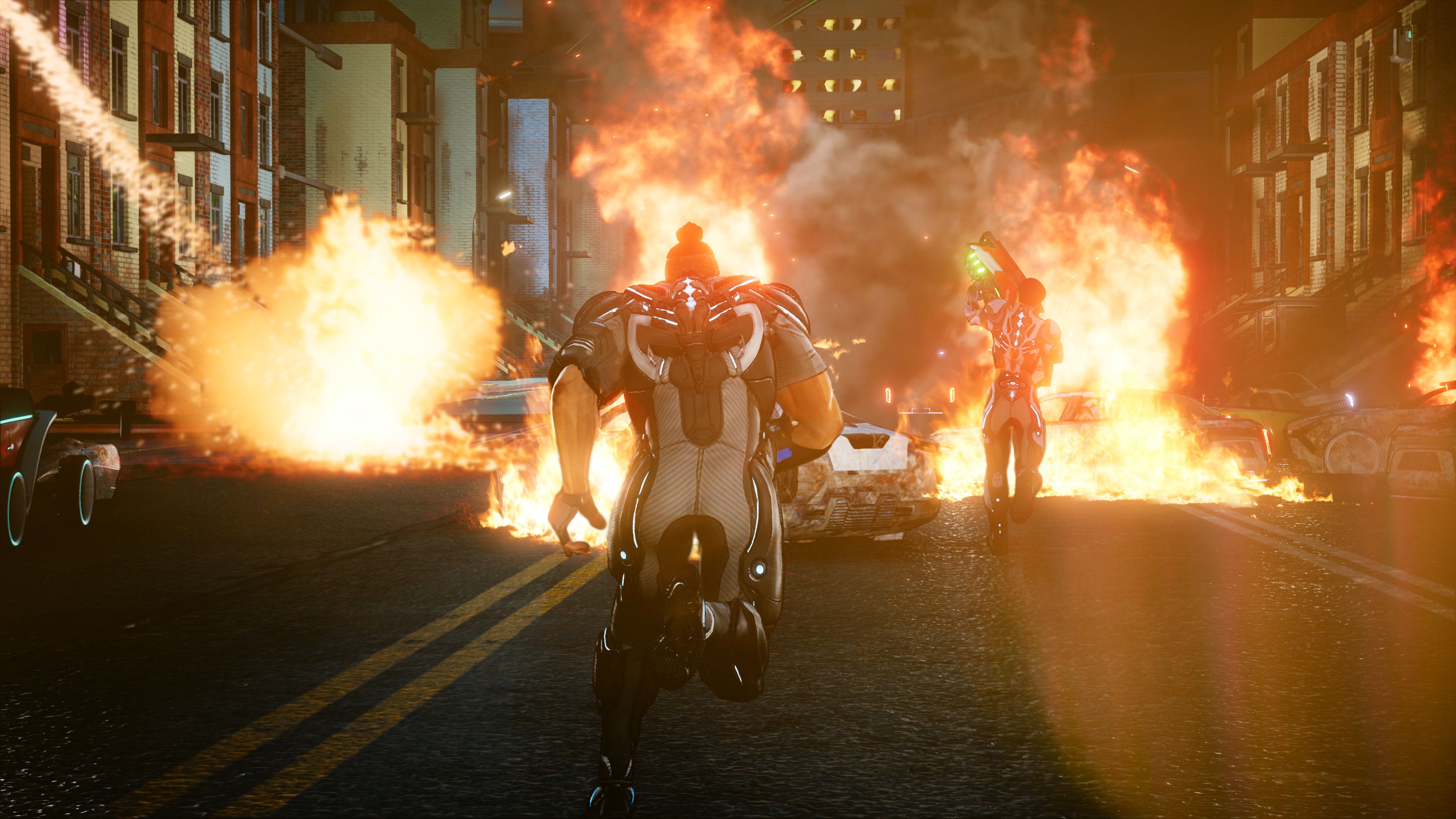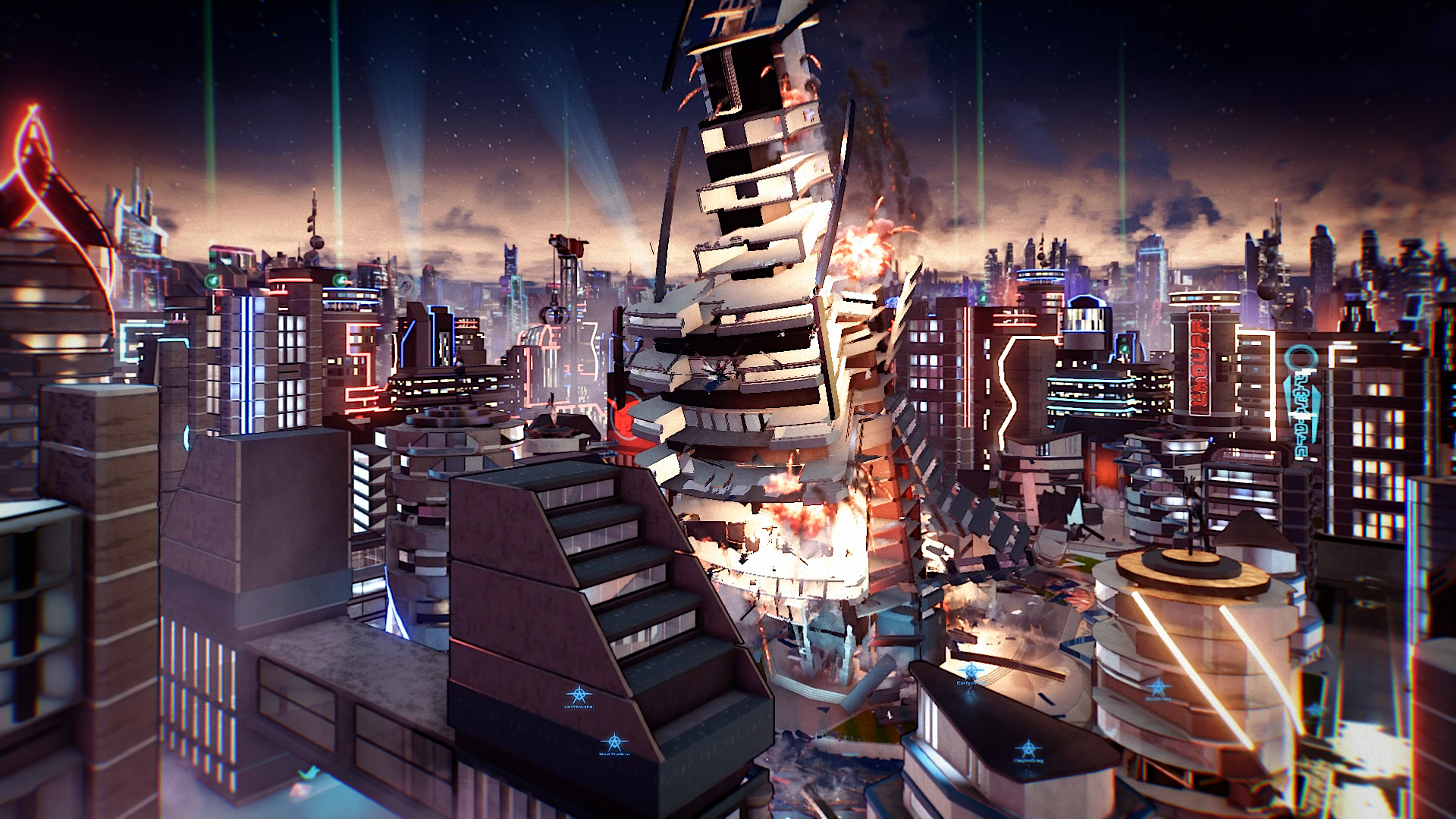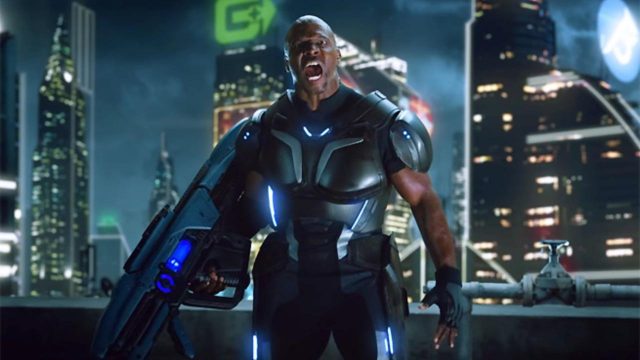If you’ve been following Crackdown 3 on it’s way up to launch, then you will have no doubt seen the impressive tech demos Microsoft once proudly displayed. They included skyscrapers crumbling, your weapon chipping tiny rocks away from walls, and pieces of debris that can be picked up and thrown individually. It was the game that displayed Microsoft’s touted cloud-powered physics, and it was meant to be the game that proved the Xbox could stand up to its biggest direct competitor. Well, it’s been a long time since then, and now, shortly after Crackdown 3‘s release, it’s fair to say the game has suffered a considerable downgrade.
If you haven’t been looking at reviews for Crackdown 3 but you saw the demonstrations from 2015, then you would be shocked to see a very different game. The campaign is bereft of any of the destruction physics that were publicized so heavily just a few years earlier. It’s a straight sequel to the original Crackdown, with nothing to really differentiate it other than some nicer graphics. If you were still waiting for the fully destructible and interactive environments that Xbox owners were promised years ago, you’ll be disappointed.
And what incredible demos they were, promising that separate buildings would have their physics calculated across multiple servers just because of the intense and detailed destruction each would undergo, synchronizing the action across multiple systems. The demos were impressive enough to convince pundits and fans alike that cloud-powered destruction could change the way game physics work. And Crackdown 3 is not that at all.
Cloud destruction

But the destructive and impressive physics are still present in Crackdown 3, in some capacity, though this is still not the game that was shown to us years ago. In Crackdown 3‘s multiplayer mode, Wrecking Zone, players explore a different, vertical environment filled with towers and buildings, and can use a full suite of abilities to jump and dash through buildings, piercing entrances and exits with your body as you move through the world.
You get a tiny glimpse of the incredible vision the developers once held. It feels like a world that you can shape and mold to your will, making your own path through the environments by force, avoid bullets by jumping inside of a building, only for rockets to tear down the walls. In many ways, it’s a fascinating and unique multiplayer mode which will give players a decent amount of fun. But it’s only a glimpse, for this world has its many limits.
For starters, the pieces you can break away from buildings here are much larger. You won’t be making artwork by shooting tiny bullet holes into the buildings; they’ll just break apart into chunky angular pieces of geometry. Will you be picking these up and throwing them around? Not really, and it’s not beneficial to anyway compared to just shooting bullets.
But what’s worse is that all of these buildings have a central frame which is nearly indestructible. This means that while panels and walls fall away from the building and you punch holes into the floor to go through the building, they won’t fall and topple in the same impressive ways the early tech demos teased us with years ago.
Even the scale of physics destruction has been reduced. Whereas multiple massive buildings and sections of the whole city were shown in demos, here it’s just a few, plain buildings. The art style even changes drastically between the campaign and multiplayer, swapping the semi-realistic city for a Tron-like neon spectacle, presumably to make the graphics easier to process in the heat of battle. It makes for a unique multiplayer experience, but it feels like an extra mode the studio needed to include to prove that Crackdown 3‘s cloud-powered destruction wasn’t just a marketing lie.
Acid rain

What happened to Crackdown 3 that it needed such a downgrade? Well, after what developers had said about individual buildings needing their own servers to compute the damage, that might be where the problems started. It’d require an obscene server farm to compute everything necessary for thousands of players worldwide, each with multiple buildings in their games at any one time. The larger, less detailed, chunks of destruction seen in Crackdown 3: Wrecking Zone are likely much easier for Microsoft’s servers to handle.
Plus, ultimately, it doesn’t add enough to gameplay. Yes, it’s fun to make your own pathways with explosions, but it’s not changing the way you play. It’s a unique multiplayer experience, but it is broadly average when pitted against its contemporaries. If multiple games are vying for your time, Crackdown 3 likely isn’t going to keep you distracted for too long. Perhaps ways to control physics objects, like the Magnesis power in The Legend of Zelda: Breath of the Wild, would’ve given the physics more reason to exist in the game, but as it is, it’s superfluous, much like the rest of the game.
Crackdown 3 was also supposed to have four-player co-op but only has two player campaign co-op instead. Like the multiplayer downgrade, this isn’t necessarily a bad thing but it’s just another case of something being downsized for release. Multiple years and delays didn’t seem to make the game better and only masked its deeper issues that resulted in a title that had eyes bigger than its stomach. Between the underwhelming destruction technology that was only pushed into the multiplayer and the smaller co-op, Crackdown 3 was defined by its downgrades and wasn’t a good enough game to rise above them.







